
ESG and sustainability: what do investors need to know about how they differ?
ESG provides a valuable tool for measuring progress, but must not be confused with the concept of sustainability as a whole.
The term “ESG” stands for Environmental, Social and Governance, three key pillars for measuring the wider impact of a business. Environmental considerations include how a company’s practices impact on the natural world, affecting issues like climate change and biodiversity loss. Social factors centre on impacts on people — whether that be employees, customers or society at large. Governance focuses on the responsible management of business operations, ranging from tax affairs to board diversity to dealing with minority shareholders.
The term “sustainability” is closely related to these three factors but has a broader, more holistic meaning tied to the long-term health of the planet and society. At the root of sustainability is the challenge of considering present needs without compromising the ability of future generations to meet their own needs. Therefore, this approach should be integrated into best business practices with the goal of reducing adverse environmental and social impacts.
While the two terms overlap significantly, we believe it is important to clearly distinguish between them. ESG can be seen as a tool to measure how companies perform in relation to specific criteria and may help demonstrate a company's commitment to sustainability. Typically, a company is given an ESG score or rating, which can highlight or quantify their exposure to E, S and G risks. While a rating can be a highly effective guide for estimating a company’s sustainability path, it does not necessarily convey the whole story of a company’s commitment to sustainability, and other deeper sustainability-related issues, such as culture, mindset or risk-appetite need to be taken into account too.
ESG: a tool for measuring a company’s exposures and progress regarding specific environmental, social and governance dimensions.
Sustainability: a broad framework encompassing responsible business practices that aim to reduce adverse environmental, social and governance-related impacts, fostering long-term viability.
Why is ESG so vital?
Building towards a more sustainable, more equitable world is not a simple task. But having some carefully defined criteria for judging progress enables us to consider how companies are performing across a range of areas.
Investors often use ESG indicators to assess factors that may have a direct impact on a business’s financial performance. For example, they can evaluate risks in areas such as carbon emissions, working conditions, diversity and inclusion, and executive pay. ESG investing holds that investors should consider not only financial gains, but also the impact of their decisions on the natural world and on society as these ultimately feed into their long-term bottom line.
Why is Sustainability so vital?
Sustainability in business “encompasses the long-term viability of a company’s operations, taking into account its environmental, social, and economic impacts”, says the Corporate Governance Institute. Success means not only strong economic returns but also contributing positively to society and reducing your business’s environmental footprint.
A business that puts sustainability at the heart of its decision-making is likely to fare well on many ESG criteria, and, at the same time, be better prepared for the future. These businesses may take care to become less exposed to physical and transition risks from sustainability-related issues, while at the same time enjoying the benefits of positive feedback loops created by their embracing sustainable business practices. While over the long term the benefits of sustainability will likely outweigh this, it is important to recognize that transitioning business models could have a negative impact on financial performance over the short term, due to the higher need for investments, among other factors.
Watch Markus Müller, our Chief Investment Officer for ESG, and Karen Sack, Executive Director of our partner Ocean Risk and Resilience Action Alliance (ORRAA), explore the difference between ESG and Sustainability — and where regeneration comes into the picture.
Click here to activate this content.
Facts about ESG
- Global ESG assets under management are on track to surpass $40 trillion by 2030, up from $30 trillion in 2022. [1]
- To bend the carbon curve and achieve net-zero, Institutional Investors Group on Climate Change (IIGCC) estimates that US$97 trillion is required between now and 2050, and sustainable investments need to grow from c. US$2 trillion pa today to US$3.5-3.7 trilllion pa, with the majority in energy (35%), mobility (31%) and buildings (19%). [2]
- Only 15 percent of investors think they have good knowledge of ESG and just three percent identify as ESG experts, according to Deutsche Bank’s ESG survey 2023. [3]
- ESG data, ratings, criteria and frameworks continue to evolve, driven by regulation as well as improved data availability. However, a standardised approach to evaluating ESG performance and disclosing ESG risks against specific metrics is still lacking. Some leading examples of current frameworks include: Corporate Sustainability Reporting Directive / European Sustainability Reporting Standards, The Global Reporting Initiative (GRI), The Sustainability Accounting Standards Board (SASB), and The Task Force on Climate-related Financial Disclosures (TCFD).
Facts about Sustainability
- The World Economic Forum’s New Nature Economy Report projects that by 2030, fully embracing nature-positive transitions across three key socio-economic systems could unlock USD 10.1 trillion in business opportunities, with China poised to capture 20 percent of this potential. [4]
- More than half of consumers (54 percent) are willing to pay more for sustainable products and services, according to a 2024 survey by global consulting firm Simon-Kucher. This marks an increase of 22 percentage points in one year. [5]
- 96 percent of the world’s biggest 250 companies report on sustainability or ESG matters. But fewer than half have leadership level representation for sustainability. [6]
Foonotes
Source: World Economic Forum, How to unlock $10.1 trillion from the nature-positive transition, June, 2024
Explore further
Find out more about how we can help and the ESG investing services we offer in your region.

ESG
ESG investment performance: drivers and management
This PERSPECTIVES Special explores the nuances behind the numbers, showing that ESG performance depends heavily on how it's defined, implemented and measured. Read for more details today.
Sep 10, 2025
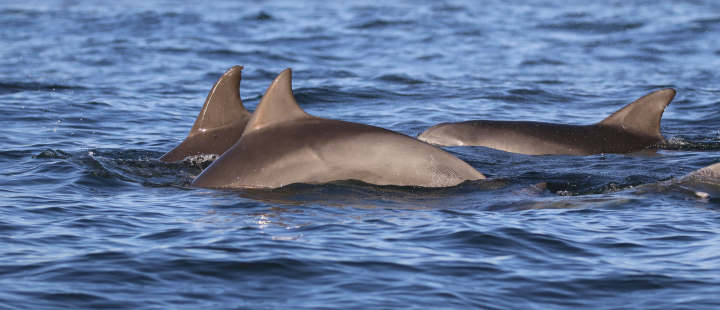
Feature article
Aussie eDNA: our sampling programme reaches Sydney Harbour
Sydney Harbour was one of the destinations for Deutsche Bank’s global eDNA sampling programme. We spoke to scientist Dr. Vanessa Pirotta about how this collaborative initiative can contribute to our knowledge of local marine life.
Jul 28, 2025

Feature article
Understanding our oceans: Deutsche Bank eDNA testing programme reaches Alaska
Deutsche Bank’s eDNA testing programme continues, giving new insights on marine life around the world.
May 23, 2025

Feature article
New Blue Perspectives: Monitoring Ocean Biodiversity
In this report, we describe initial findings from our research project to monitor ocean biodiversity. Working with our partners, we used environmental DNA (eDNA) techniques to analyse ocean water samples.
Oct 10, 2024

Feature article
eDNA: measuring ocean biodiversity
We’re always looking for ways to connect our partners and raise awareness of things we know our clients care about. Together with our partners, we track biodiversity in our ocean in this eDNA project initiative.
Oct 01, 2024
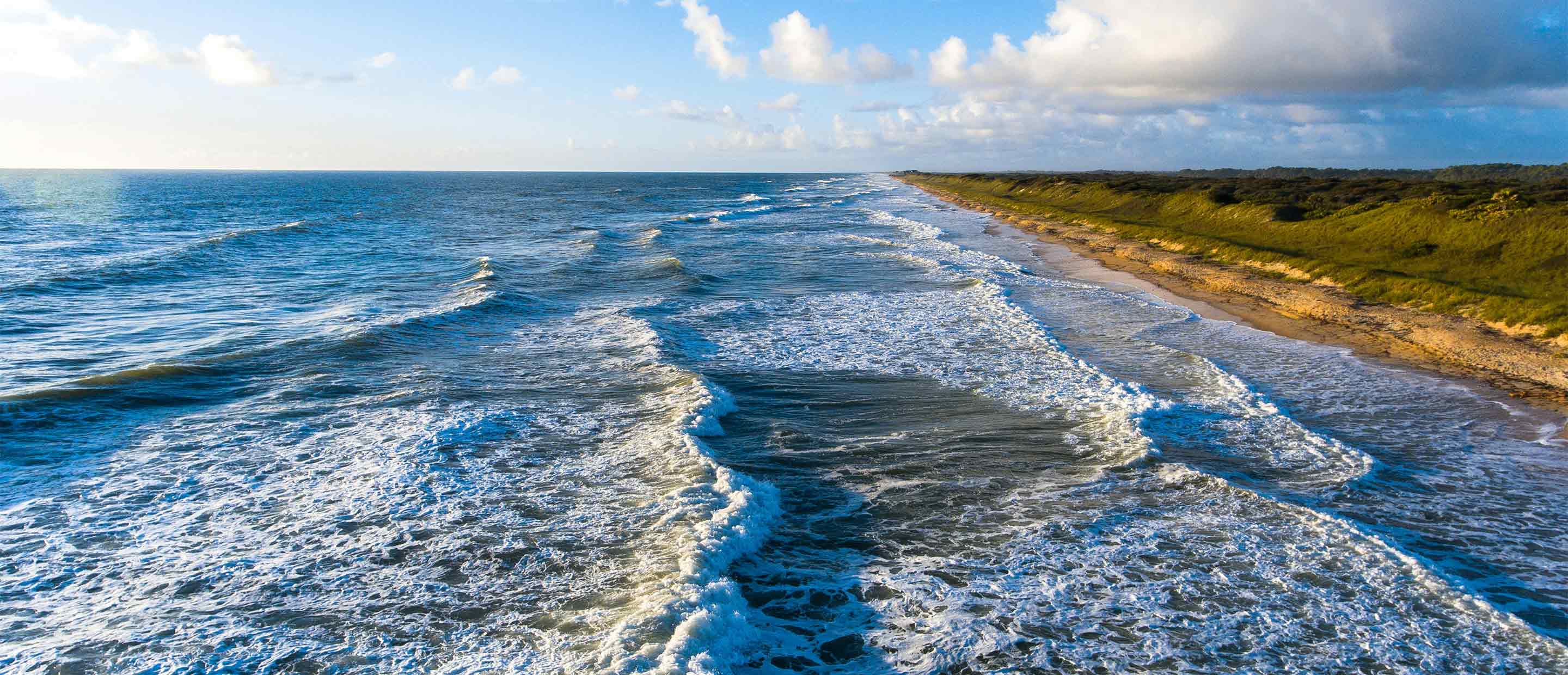
Jargon-busting series
What are Life Pillars?
Life Pillars provide essential resources and services crucial for the prosperity of humanity and the global economy — and yet they are often undervalued or taken for granted.
Aug 01, 2024

The sustainable blue economy
An ocean journey
We are on a journey to raise awareness about the importance of the ocean to the global economy and life on earth. Our focus on the ocean has shaped our research and deepened our understanding of the links between nature and the economy.
Jun 10, 2024
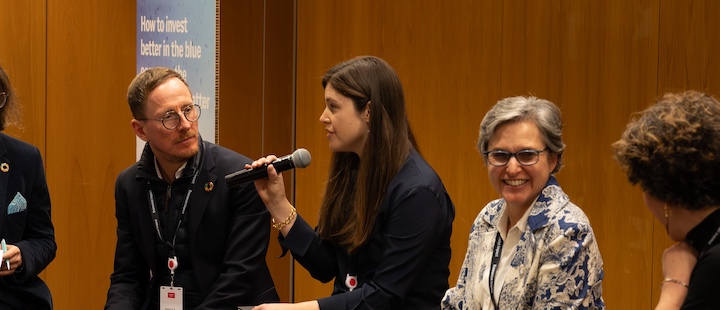
The sustainable blue economy
The metrics that matter: investing in the sustainable blue economy
At the Economist’s 11th annual World Ocean Summit, we hosted a "How To" session aimed at creating a set of action points and practical takeaways for individuals and organisations committed to restoring ocean health.
Jun 10, 2024

Future Fundamentals podcast
Investing in the Blue Economy: a blueprint for action
In our Future Fundamentals podcast, Karen Sack, of ORRAA, and Markus Müller, our Chief Investment Officer for ESG, take a deep dive into the sustainable blue economy.
Apr 26, 2024
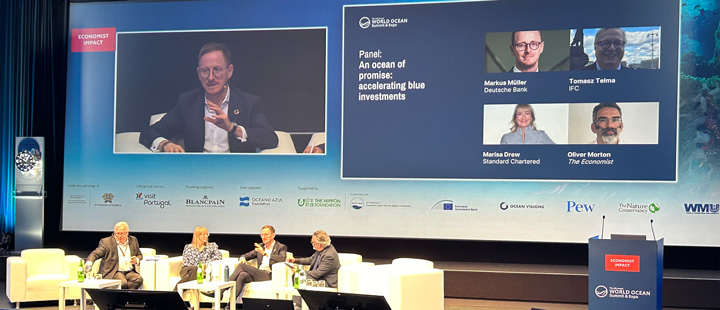
Expert View
The 2024 Economist Impact World Ocean Summit
Our CIO for ESG, Markus Müller, addressed some of the world's leading ocean thinkers, investors and advocates at this event in Lisbon designed to drive progress towards a sustainable blue economy.
Apr 25, 2024

PERSPECTIVES Special
ESG & investment performance: think strategically
The key to sustained long-term returns from ESG investment is effective strategic asset allocation.
Oct 24, 2023

PERSPECTIVES Special
Smart mobility: switch, optimise, prioritise
Once we looked to technology to make transportation systems cheaper, faster or safer. But “smart mobility” needs to be more sustainable too - and the primary challenge may be social in nature.
Oct 20, 2023

Feature article
Entrepreneurs on creating businesses for the good of the oceans
A new generation of individuals are setting up companies worldwide to radically overhaul how we interact with our oceans, and help save our planet while building a sustainable blue economy. Chris Stokel-Walker of LUX magazine speaks to entrepreneurs trying to make a positive impact in the ocean space.
Aug 15, 2023

Feature article
Creating positive energy: how to accelerate green infrastructure
To achieve the Paris Agreement target of net zero by 2050, the world needs to shift to green infrastructure – now. In this feature for LUX magazine, Claire Asher shows how the public and private sectors can speed the move from fossil fuels to green energy.
Aug 15, 2023
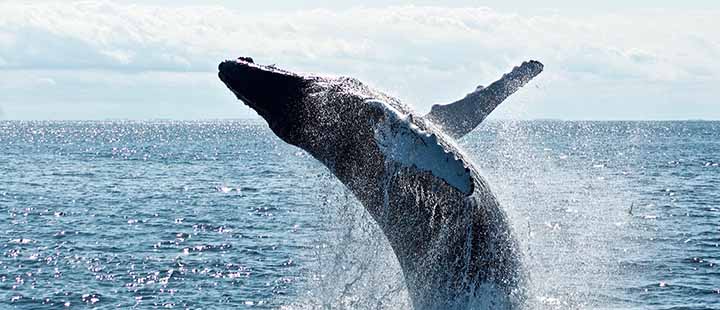
Jargon-busting series
What is the blue economy?
The sustainable blue economy refers to all economic activity linked to the ocean that takes place within a framework designed to protect the environment, conserve natural resources and allow for equitable development.
Aug 14, 2023

CIO Nature Series
Rainforests: the Earth’s green lung
Rainforests provide invaluable ecosystem services supporting climate management, biodiversity, and rural livelihoods—but they are also fragile. In this publication, we focus on four key concerns: deforestation, climate change, poaching and illegal trade, and mining and oil extraction
Aug 02, 2023

The sustainable blue economy
Baroness Scotland: for the common good
Baroness Scotland, Secretary-General of the Commonwealth, has witnessed the effects of climate change on her home country, Dominica, first hand. She tells LUX magazine how the world’s financial institutions need to get creative to help developing nations combat climate change.
Jul 04, 2023

PERSPECTIVES Special
The Ocean: an essential pillar of planetary life
In this publication, we take a close look at the environmental benefits we gain from the marine environment, the definition of a Sustainable Blue Economy, development areas and problems and how we can help finance sustainable maritime nature-based projects.
Jun 08, 2023

Feature article
Markus Müller on creating the virtuous circle
Markus Müller discusses how the ocean, biodiversity, the global economy and the world of finance are inextricably linked – and proposes what should be done now to make business fit for a nature-compliant future.
May 22, 2023

Feature article
Ocean investment: from north to south
Karen Sack, a leading voice in the ocean economy, speaks to LUX about how only action and investment from the Global North can allay the effects of global warming on the world economy – and its most vulnerable nations
Apr 27, 2023
See more


